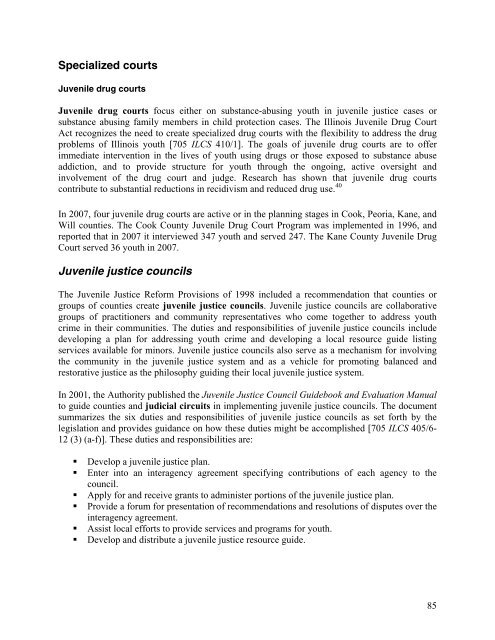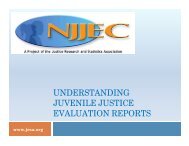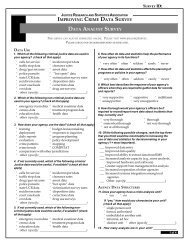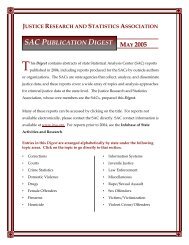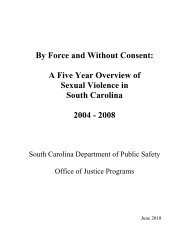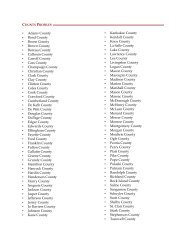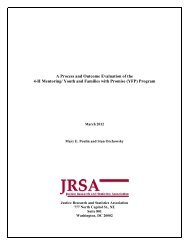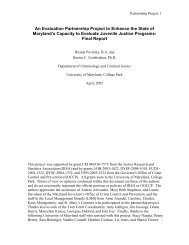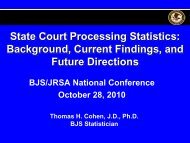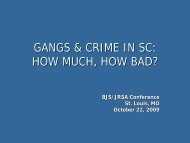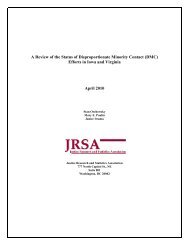Juvenile Justice System and Risk Factor Data - Illinois Criminal ...
Juvenile Justice System and Risk Factor Data - Illinois Criminal ...
Juvenile Justice System and Risk Factor Data - Illinois Criminal ...
You also want an ePaper? Increase the reach of your titles
YUMPU automatically turns print PDFs into web optimized ePapers that Google loves.
Specialized courts<br />
<strong>Juvenile</strong> drug courts<br />
<strong>Juvenile</strong> drug courts focus either on substance-abusing youth in juvenile justice cases or<br />
substance abusing family members in child protection cases. The <strong>Illinois</strong> <strong>Juvenile</strong> Drug Court<br />
Act recognizes the need to create specialized drug courts with the flexibility to address the drug<br />
problems of <strong>Illinois</strong> youth [705 ILCS 410/1]. The goals of juvenile drug courts are to offer<br />
immediate intervention in the lives of youth using drugs or those exposed to substance abuse<br />
addiction, <strong>and</strong> to provide structure for youth through the ongoing, active oversight <strong>and</strong><br />
involvement of the drug court <strong>and</strong> judge. Research has shown that juvenile drug courts<br />
contribute to substantial reductions in recidivism <strong>and</strong> reduced drug use. 40<br />
In 2007, four juvenile drug courts are active or in the planning stages in Cook, Peoria, Kane, <strong>and</strong><br />
Will c ounties. The Cook County <strong>Juvenile</strong> Drug Court Program was implemented in 1996, <strong>and</strong><br />
reported that in 2007 it interviewed 347 youth <strong>and</strong> served 247. The Kane County <strong>Juvenile</strong> Drug<br />
Court served 36 youth in 2007.<br />
<strong>Juvenile</strong> justice<br />
councils<br />
The <strong>Juvenile</strong> <strong>Justice</strong> Reform Provisions of 1998 included a recommendation that counties or<br />
groups of counties create juvenile justice councils. <strong>Juvenile</strong> justice councils are collaborative<br />
groups of practitioners <strong>and</strong> community representatives who come together to address youth<br />
crime in their commun ities. The duties <strong>and</strong> responsibilities of juvenile justice councils include<br />
develo ping a plan for addressing youth crime <strong>and</strong> developing a local resource guide listing<br />
servic es available for minors. <strong>Juvenile</strong> justice councils also serve as a mechanism for involving<br />
the com munity i n the<br />
juvenile justice system <strong>and</strong> as a vehicle for promoting balanced <strong>and</strong><br />
restorative justice as the philosophy guiding their local juvenile justice system.<br />
In 2001, the Authority published the <strong>Juvenile</strong> <strong>Justice</strong> Council Guidebook <strong>and</strong> Evaluation Manual<br />
to guide counties <strong>and</strong> judicial circuits in implementing juvenile justice councils. The document<br />
summarizes the six duties <strong>and</strong> r esponsibilities of juvenile justice councils as set forth by the<br />
legislation <strong>and</strong> provid es guidance on how these duties might be accomplished [705 ILCS 405/6-<br />
12 (3) (a-f)]. These duties <strong>and</strong> responsibilities are:<br />
• Develop a juvenile justice plan.<br />
• Enter into an interagency agreement specifying contributions of each agency to the<br />
council.<br />
• Apply for <strong>and</strong> receive grants to administer portions of the juvenile justice plan.<br />
• Provide a forum for presentation of recommendations <strong>and</strong> resolutions of disputes over the<br />
interagency agreement.<br />
• Assist local efforts to provide services <strong>and</strong> programs for youth.<br />
• Develop <strong>and</strong> distribute a juvenile justice resource guide.<br />
85


